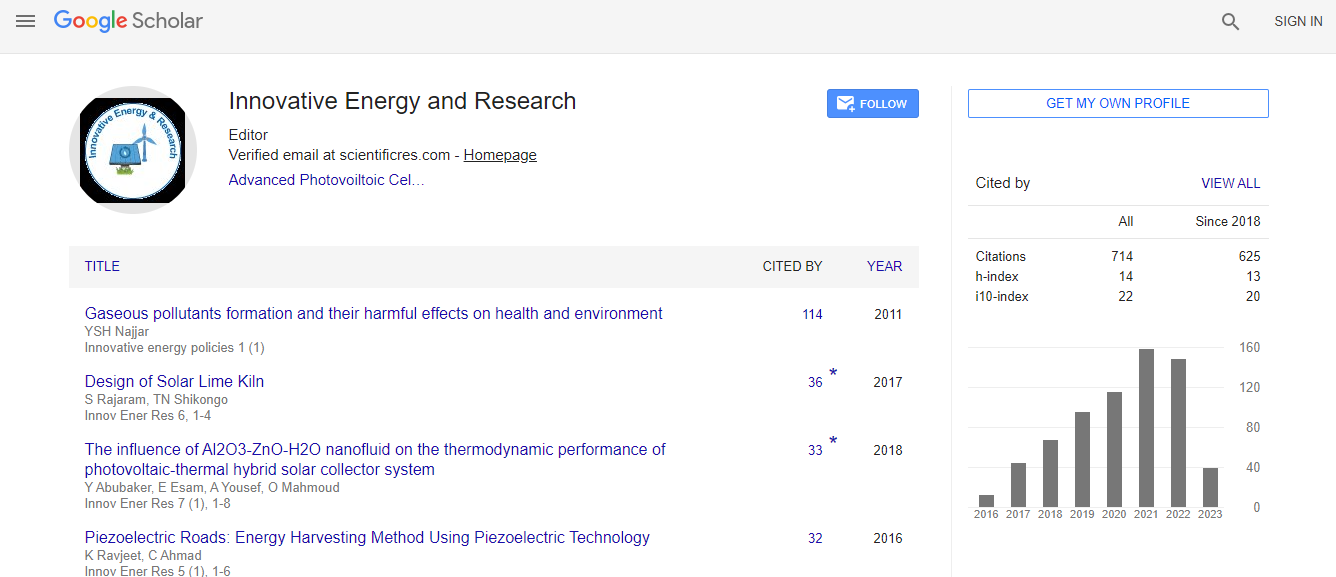Our Group organises 3000+ Global Conferenceseries Events every year across USA, Europe & Asia with support from 1000 more scientific Societies and Publishes 700+ Open Access Journals which contains over 50000 eminent personalities, reputed scientists as editorial board members.
Open Access Journals gaining more Readers and Citations
700 Journals and 15,000,000 Readers Each Journal is getting 25,000+ Readers
Google Scholar citation report
Citations : 712
Innovative Energy & Research received 712 citations as per Google Scholar report
Innovative Energy & Research peer review process verified at publons
Indexed In
- Google Scholar
- Open J Gate
- Genamics JournalSeek
- RefSeek
- Hamdard University
- EBSCO A-Z
- Publons
- Euro Pub
- ICMJE
Useful Links
Recommended Journals
Related Subjects
Share This Page
Material synthesis and optimization for high performance triboelectric nano generators
21st International Conference on Advanced Energy Materials and Research
Jikui Luo
University of Bolton, UK
Keynote: Innov Ener Res
Abstract
Energy harvesting technology is an emerging technology, particularly important for the wireless sensor networks as it is the core technology for internet of things (IoT), smart manufacturing and smart cities, etc. Since, wireless sensors are typically installed on mobile objects, in remote areas or harsh environments, it is extremely challenging to maintain their long-term sensing/monitoring function due to the requests for constant electrical power or periodical replacement of batteries. Energy harvesting technologies have been explored to power wireless sensors by utilizing piezoelectric, pyroelectric, electromagnetic and triboelectric effects. Triboelectric nanogenerator (TENG) is regarded as the most suitable one owing to its very high power outputs and conversion efficiency. Great efforts focus on the performance enhancement through the innovations to increase surface charge density. Searching for better materials and optimal combination and modifying materials properties are the two common methods for obtaining triboelectric materials with high surface charge densities. We have been working on these for a while and achieved composite materials with excellent triboelectric properties and various optimal material combinations for TENGs. The talk will highlight our work on the best tribo-positive materials, synthesis of tribo-negative composites using polyvinylidene difluoride (PVDF) or polytetrafluoroethylene (PTFE) incorporated with piezo/ferroelectric nanomaterials such as ZnO and Barium titanate (BTO) etc, and specific design for the electrode and tribomaterial interfaces. Using the best material combination and optimized device structures, we have fabricated flat-surface TENGs with peak voltage output over 1200 V and instantaneous power density in the range of 40-120 W/m2 with excellent stable function. Author will also present our latest unique technologies of the TENG-based chipless wireless sensors with self-identification capability and TENG as a wireless power source.Recent Publications
1. H Zhang, L W Quan, J K Chen, C K Xu, C H Zhang, S R Dong, C F Lu and J K Luo (2019) A general optimization approach for contact-separation triboelectric nanogenerator, Nano energy 56:700.
2. L Shi, S R Dong, P Ding, J K Chen, S T Liu, S Y Huang, H S Xu, U Farooq, S M Zhang, S J Li and J K Luo (2019) Carbon electrode enables flat surface PDMS and pa6 triboelectric nanogenerators to achieve significantly enhanced triboelectric performance. Nano energy 55:548.
3. P F Zhao, N Soin, K Prashanthi, J K Chen, S R Dong, E P Zhou, Z G Zhu, A A Narasimulu, C D Montemagno, L Y Yu and J K Luo (2018) Emulsion electrospinning of polytetrafluoroethylene (PTFE) nanofibrous membranes for high-performance triboelectric nanogenerators, ACS Appl. Mater. & Interface. 10:5880.
4. P Ding, J K Chen, U Farooq, P F Zhao, N Soin, L Y Yu, H Jin, X Z Wang, S R Dong and J K Luo (2018) Realizing the potential of polyethylene oxide as new positive tribo-material: over 40 W/m2 high power flat surface triboelectric generators. Nano energy 46:63.
5. R Z Pan, W P Xuan, J K Chen, S R Dong, H Jin, X Z Wang, H L Li and J K Luo (2018) Fully biodegradable triboelectric nanogenerators based on electrospun polylactic acid and nanostructured gelatin films. Nano energy 45:193
Biography
Jikui Luo received his PhD Degree from the University of Hokkaido, Japan in 1989. He worked in Cardiff University as a Research Fellow, in Newport Wafer Fab., Philips Semiconductor Co. and Cavendish Kinetics Ltd as an Engineer, Senior Engineer and Manager and then in Cambridge University as a Senior Researcher from 2000. From January 2007, he became a Professor in MEMS at the Centre for Material Research and Innovation (CMRI), University of Bolton. His current research interests focus on sensors, actuators, flexible/wearable electronics and lab-on-chips for biotechnology and healthcare applications and nanomaterials, nanodevices, energy harvesting technology, wireless sensors, etc. He has over 230 publications in peer review international journals, and about 190 talks and presentations at international conferences, among them about 40 are invited talks or plenary/keynote speaks.
E-mail: jl2@bolton.ac.uk

 Spanish
Spanish  Chinese
Chinese  Russian
Russian  German
German  French
French  Japanese
Japanese  Portuguese
Portuguese  Hindi
Hindi 
